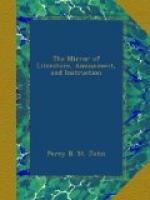To attempt to rouse him seemed only to increase their violence—as if the very sound of the human voice was, under his dreadful circumstances, intolerable, as renewing the sense of reality to a reason already clouding, and upon the verge of temporary deliquium. He was the picture of despair. As he turned his face to one side, I saw that a few, but very few hot tears had been forced from his glassy and blood-shot eyes; and in his writhings he had scratched one cheek against his iron bedstead, the red discoloration of which contrasted sadly with the deathly pallidness of hue, which his visage now showed: during his struggles, one shoe had come off, and lay unheeded on the damp stone-floor. The demon was triumphant within him; and when he groaned, the sound seemed scarcely that of a human being, so much had horror changed it. I kneeled over him—but in vain. He heard nothing—he felt nothing—he knew nothing, but that extremity of prostration to which a moment’s respite would be Dives’ drop of water—and yet in such circumstances, any thing but a mercy. He could not bear, for a moment, to think upon his own death—a moment’s respite would only have added new strength to the agony—He might be dead; but could not “—die;” and in the storm of my agitation and pity, I prayed to the Almighty to relieve him at once from sufferings which seemed too horrible even to be contemplated.
How long this tempest of despair continued, I do not know. All that I can recall is, that after almost losing my own recollection under the agitation of the scene, I suddenly perceived that his moans were less loud and continuous, and that I ventured to look at him, which I had not done for some space. Nature had become exhausted, and he was sinking gradually into a stupor, which seemed something between sleep and fainting. This relief did not continue long—and as soon as I saw him begin to revive again to a sense of his situation, I made a strong effort, and lifting him up, seated him again on the pallet, and, pouring out a small quantity of wine, gave it him to drink, not without a forlorn hope that even wine might be permitted to afford him some little strength to bear what remained of his misery, and collect his ideas for his last hour. After a long pause of returning recollection, the poor creature, got down a little of the cordial and as I sat by him and supported him, I began to hope that his spirits calmed. He held the glass and sipped occasionally, and appeared in some sort to listen, and to answer to the words of consolation I felt collected enough to offer. At this moment the low and distant sound of a clock was heard, distinctly striking one. The ear of despair is quick;—and as he heard it, he shuddered, and in spite of a strong effort to suppress his emotion, the glass had nearly fallen from his hand. A severe nervous restlessness now rapidly grew upon him, and he eagerly drank up one or two small portions of wine, with which I supplied him. His fate was




